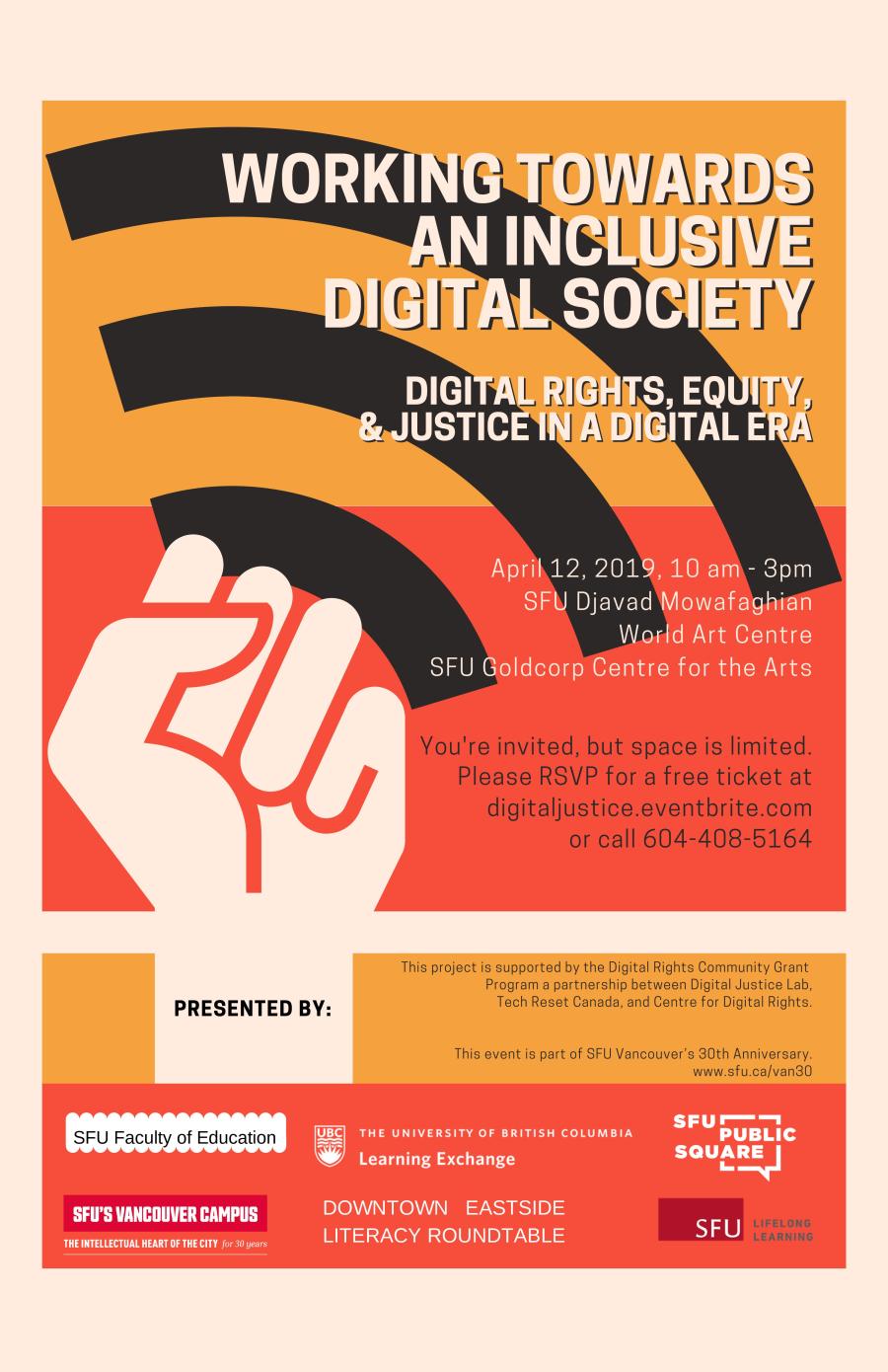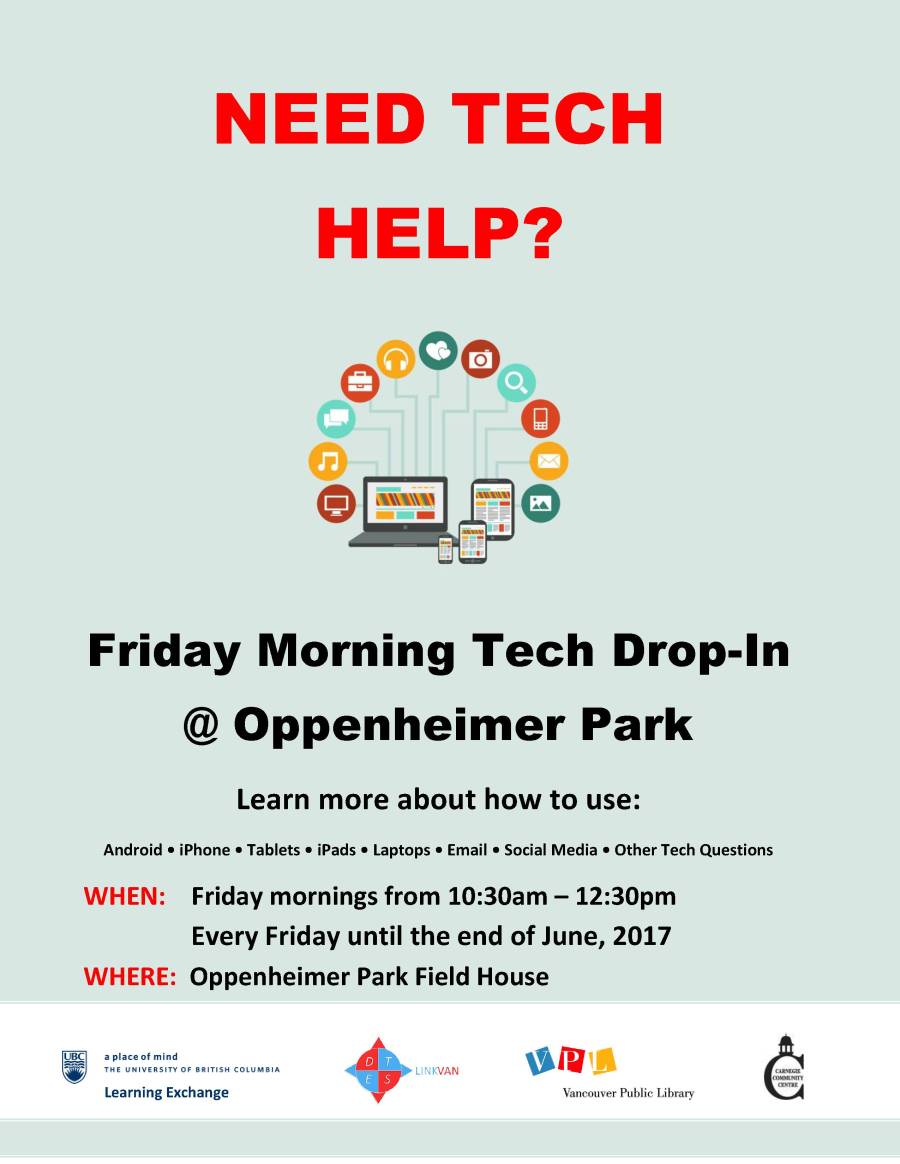This article tells the story of “LinkVan” a project that explores approaches to participatory technology design to forge more equitable digital and social relations in the Downtown Eastside (DTES) community of Vancouver, British Columbia. LinkVan began as a project to create a literacy-friendly online service directory for low-income and homeless citizens. We trace the experiences and patterns of digital inequality that led to the formation of the project and describe the evolving approach to technology design oriented to “the direct involvement of people in the co-design of the technologies they use” (Simonsen & Robertson, 2013 p. 2). We consider insights from 58 user experience interviews that suggest the precariousness of access, the centrality of digital literacy education in participatory technology design, and the potential of side-by-side ‘conversations at the interface’ (Attar, 2005; Barbatsis, Comacho, & Jackson, 2004) to imagine new digital landscapes and new social relations. Read More
Category: Events
On April 12, 2019, the DTES Literacy Roundtable, UBC Learning Exchange, and SFU Faculty of Education brought together community-based agencies and stakeholders from across BC who are concerned with digital literacy and digital rights. The aims of the forum were:
- to raise awareness about the connections between digital education and digital rights;
- to share information about digital inequalities experienced by organizations and the communities they serve; and,
- to share resources to help address these issues.
Participants included representatives from frontline literacy and social service agencies,
university researchers, librarians, non-profit social rights and anti-poverty groups and adults who have lived experience with digital inequalities.

Title: Digital Justice work, gaps and opportunities: what’s needed from stakeholders to work towards the share goal of justice in our communities?
Goal: To have a discussion with stakeholders to identify gaps and opportunities to cross-pollinate the work being done in their respective areas of justice work with that of digital justice. The starting point of the conversation can be the Vancouver Digital Strategy document. People in the room can bring perspectives from their own field of work in the community to discuss the city’s digital strategy and identify gaps and areas of opportunity within and around it. (I am open to having a different starting point, however).
Concrete outcome: Ideally, by the end of the session the group will have an initial document outlining areas of opportunity for cross-pollination and gaps where digital justice work could have done better to contribute to the more holistic aspect of justice work.
Duration: 30min
April 12, 2019, 10 am – 3 pm (registration opens at 9:30 am)
SFU David Mowafaghian World Art Centre, SFU Goldcorp Centre for the Arts
149 West Hastings Street, Vancouver, BC | Musqueam, Squamish & Tsleil-Waututh Territory
Note: Due to construction, please enter from Cordova Street between Abbott and Cambie
Agenda*
| 9:30 am to 10:00 am | Registration and Mingling |
| 10:00 am to 10:10 am | Opening Prayer: Elder Doris Fox |
| 10:10 am to 10:20 am | MC Welcome: Goals for the day with Suzanne Smythe, SFU |
| 10:20 am to 10:50 am | Keynote: Connecting Missions: The Role Of Digital Justice in our
Fight for Human Rights Speaker: Marianela Ramos Capelo, OpenMedia |
| 10:50 am to 11:00 am | Break |
| 11:00 am to 11:30 am | Breakout Sessions:
1. All Things Tech Café – LinkVan Community Ambassadors 2. TBC – Check Your Head 3. Digital Justice Work, Gaps, and Opportunities: What’s Needed from Stakeholders to Work towards the Shared Goal of Justice in our Communities? 4. Digital Literacy and Poverty – PovNet 5. WILD CARD |
| 11:30 am to 12:00 am | Breakout session highlights, key points, and discussion with Ingrid Mendez |
| 12:00 am to 12:30 pm | Lunch Break |
| 12:30 pm to 1:30 pm | Panel Discussion: Working Towards a Digitally Inclusive Society
Panel Moderator: Shantel Ivits, Vancouver Community College Panel Guests: Lucy Alderson, Capilano University Dionne Pelan, UBC Learning Exchange Ingrid Mendez, Watari Beth Davies, Chief Librarian, Burnaby Public Library Shawna Duncan, First Nation Tech Council |
| 1:35 pm to 2:05 PM | Breakout Sessions:
6. TBC – Free Geek 7. Digital Literacy Best Practices – Suzanne Smythe (SFU), Dionne Pelan (UBC Learning Exchange), William Booth (DTES Literacy Roundtable) 8. Online Governance – Vancouver Public Library 9. Equity and Digital Literacies: Issues of Access, Ethics and Engagement in a Youth Community Setting – Youth Directions 10. WILD CARD |
| 2:05 pm to 2:10 pm | Break |
| 2:10 pm to 2:40 pm | Breakout session highlights, key points, and discussion (large group) |
| 2:40 pm to 3:00 pm | Closing Remarks |
* Session titles and times are subject to change. The final conference agenda will be available on April 12 at the event.
If you are struggling with your phone, computer, or any other form of technology, consider stopping by a tech café. In collaboration with the Downtown Eastside Literacy Roundtable and the UBC Learning Exchange, our pop-up tech cafés take place in a variety of community settings throughout the Downtown Eastside. We offer assistance, free of charge, for individuals who may be experiencing challenges with their electronic devices. We can offer support in a variety of ways such as: sending emails, using social media, connecting to Wi-Fi, updating phone and computer settings, managing files and photos, filing taxes, and many other basic to advanced skills. If we are unable to answer your query, we would be more than happy to refer you to another source for further help. Additionally, we also provide laptops for shared use if you require access to the Internet, or any word processing applications.
Another one of our initiatives we would like to encourage is LinkVan.ca. This website database provides up-to-date information about a variety of services offered in the Downtown Eastside community including: shelter availability, food services, medical support, hygiene, technology, and legal supports. There is also a compilation of crisis lines available on the site. Accessible through desktop or mobile browsers, the website is simple to navigate, and is continually updated to provide accurate information. We also include extreme weather warnings and other emergency notifications. Please visit LinkVan.ca for more information, or stop by one of our tech cafés; we would be happy to work with you.
If you are interested in attending a drop-in tech café, the locations and times are as follows:


15 th February Carnegie Community Centre Newsletter
Community Ambassadors Offer Peer-to-Peer Support in Digital Literacy
Jamie Hillman – Community Based Digital Literacy Assistant
If you are struggling with your phone, computer, or any other form of technology, consider stopping by a tech café. In collaboration with the Downtown Eastside Literacy Roundtable and the UBC Learning Exchange, our pop-up tech cafés take place in a variety of community settings throughout the Downtown Eastside.
We offer assistance, free of charge, for individuals who may be experiencing challenges with their electronic devices. We can offer support in a variety of ways such as: sending emails, using social media, connecting to Wi-Fi, updating phone and computer settings, managing files and photos, filing taxes, and many other basic to advanced skills. Additionally, we also provide laptops for shared use if you require access to the Internet, or any word processing applications. Our team consists of UBC students, ambassadors from within the community, and other volunteers to offer peer-to-peer support. We would like to acknowledge that our cafés are made possible by the support of Carnegie, as well as the Vancouver Public Library, Neca?mat branch. If we are unable to answer your query, we would be more than happy to refer you to another source for further help.
Another one of our initiativeswe would like to encourage is LinkVan.ca. This website database provides up-to-date information about a variety of services offered in the Downtown Eastside community including: shelter availability, food services, medical support, hygiene, technology, and legal supports. There is also a compilation of crisis lines available on the site. Accessible through desktop or mobile browsers, the website is simple to navigate, and is continually updated to provide accurate information. We also include extreme weather warnings and other emergency notifications. Please visit LinkVan.ca for more information, or stop by one of our tech cafés; we would be happy to work with you.
If you are interested in attending a drop-in tech café, the locations and times
are as follows:
The Carnegie, 3 rd Floor – Tuesdays 10:30-12:30,
EastSide Works, 57 East Hastings – Thursdays 1:00-3:30,
Oppenheimer Park, Field House – Fridays 10:30-12:30,
WISH, 334 Alexander Street – monthly.
The Downtown Eastside Literacy Roundtable in collaboration with the UBC Learning Exchange will be hosting a public forum/discussion about technology and digital literacy in the Downtown Eastside. The forum will also feature a report back on digital equity research in the DTES and invite feedback and identify issues for further action.
We hope you can join us, along with other non-profit staff, educators, and community members to discuss issues communities face that prevent participation in the digital world.
When: March 21, 2018 @ 9:30 am – 12:30
Where: 612 Main Street.
Appetizers and refreshments will be provided. If you are able to join us please RSVP to marie.urdiga@ubc.ca.

Shirley Walters directed the Centre for Adult and Continuing Education and the Division for Lifelong Learning over 30 years. She is a feminist and social justice activist working locally and globally. She currently serves as deputy president (Africa) on the International Council for Adult Education (ICAE). Her latest co-edited book (with Astrid von Kotze) is Forging Solidarity: Popular Education at Work 2017 Sense Publishers, Rotterdam.
Join us for an informal learning exchange with Dr. Shirley Walters, Professor Emerita, Adult & Continuing Education, University of Western Cape, South Africa. She will share what’s going on in South Africa in relation to Adult Learning and Education, and she is eager to learn from us about what is going on in the DTES. The discussion will focus around some key themes:
- What and how do socio-economic factors in the South African context impact literacy?
- How do literacy workers in South Africa define literacy?
- How can groups overcome ‘fragmented activism’ to advocate for change and what does that look like in the South African context?
WHEN: Thursday June 8, 3:00- 4:30
WHERE: 612 Main Street
RSVP: Spring.gillard@ubc.ca (Space is limited)




